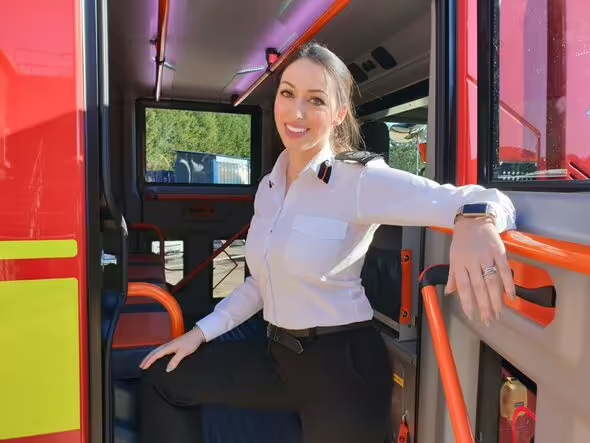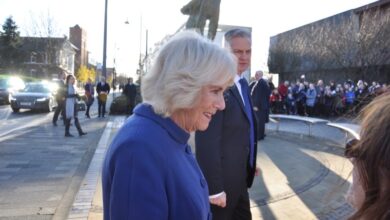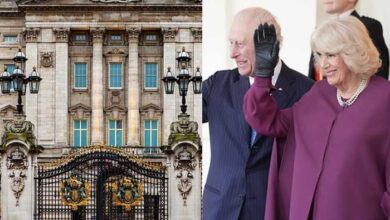It’s a long story: I slept rough as a teenager, now I’m Prince William’s…

With her ongoing career as a professor at Cardiff University, a PhD and her immaculate personal grooming, Dr Sabrina Cohen-Hatton, 41, is far from the traditional image of a fire-fighter. As Chief Fire Officer for West Sussex Fire & Rescue Service – the highest rank a firefighter in the UK can achieve – she’s one of the UK’s most senior female members of the service.
She also advises Prince William on his campaign to end homelessness for Sabrina is an unusual senior member of the fire service for another, quite remarkable, reason.
For two years as a teenager, she was a homeless rough-sleeper on the streets of South Wales. She credits her survival during that turbulent period to her relationship with a remarkable stray dog she affectionately named Menace, who befriended her after the death of her father when she was nine.
“My mother struggled terribly with mental health issues, and after my father died she really struggled to cope,” she tells me. “We lived in abject poverty for several years as a result and by the time I was 15, we were in a really volatile situation.
“My mum loved me dearly, but she didn’t have the capacity to be able to look after me properly. I was terrified of going into care, so I hid what was going on from school, and started to sleep rough.
Her experiences pre-date the Children Act 2004 which puts a duty on public bodies to share information about at-risk children. “I left school the following year, aged 16, with no qualifications,” continues Sabrina. “I was completely emotionally isolated and there was no-one around to help me.
“I can’t tell you the number of times people boot you in your sleeping bag or had their sleeping bags set on fire. Having Menace with me saved my life for sure; he really was an early warning system.”
Prince William with Sabrina Cohen-Hatton
She breaks into a smile about the small cross breed, who is black with a white chest. “He was not the type of dog that would have fought off an attacker, but he would poke his head out and start barking.”
Menace came running up to Sabrina one day while she was sitting on some steps
Tail wagging, he jumped up and licked my face, and I said, ‘Ah, you are a menace’. He had sweet little triangular ears,” she recalls. From that point on, the two were inseparable.
“Menace was instrumental in my recovery from homelessness,” she says. “Poverty is not something you can wash off your skin; it’s internal. But having him meant I did have a connection at a time when I found it hard to trust people.”
Sabrina is talking to raise awareness of StreetVet, a charity of which she is an ambassador, during the Big Give.
Big Give’s Christmas Challenge has become one of the UK’s biggest fundraising appeals, rivalling Comic Relief and Children in Need in scale. This year, 1,250 charities are taking part and all public donations over the next week via biggive.org will be doubled by match-funding ‘champions’ – philanthropists, companies and foundations. Last year, Big Give’s Christmas Challenge raised more than £33million in just one week and this year it is aiming to break that record.
“StreetVet was set up by Jade Statt, a vet who was speaking to a rough sleeper with a dog who noticed a canine skin condition that was easily treatable with the right cream,” she explains.
This was the charity’s founding moment. She says: “StreetVet has an amazing network of vets who give their time, delivering free essential veterinary care to the pets of people experiencing homelessness. They also have a scheme to help identify places homeless people can go with their dogs; a game changer that helps to keep the benefit of the human-animal bond.
“When I was a young girl sleeping rough, people would exploit my vulnerabilities, but Menace kept me safe because he would alert me to what was going on by barking.
“He was instrumental in my recovery from homelessness, and having been on the other side, I appreciate how life-changing the work of StreetVet can be. Without veterinary care, issues that can be easily sorted out can quickly become a huge source of concern.
The presence of her much-loved little dog did make it difficult for her to access other support services, but Sabrina insists: “If it’s a choice between a bed for a night or a dog there is no choice; the dog wins every time.”
She was in the middle of her GCSEs when she made the decision to leave home.
Sabrina would stash her school books in a box in a derelict building after studying on the street – fearful that asking for a school locker would “alert social services” and plunge her family deeper into crisis.
However, her books were eventually torn apart by a neo-Nazi skinhead who saw her Jewish surname – Cohen – on the cover of a book and attacked her.
“He put out a cigarette on my arm. He really went to town on me. It was a horrible experience,” recalls Sabrina, who once awoke to find someone urinating on her. She turned to selling the Big Issue magazine to scrape a living.
“You buy it at cost and sell your stock at a profit,” she explains. “After the attack, I kept my school books in a box in the Big Issue office. And I kept studying. I saw qualifications as a ticket out of there.”
Soon, she had earned enough to get secure rented housing. Menace went with her. “I didn’t have anything, but I had my dog, and he represented structure at a time when it was easy to feel lost.”
Once securely housed, Sabrina says she started to wonder what else could be a reality.
“I realised I wanted to be able to do something to help other people when they are feeling vulnerable, to give them the support I would like to have received. And that’s what attracted me to the Fire Service – because I knew what it felt to be having the worst day of your life.”
At the age of 18, she became a part-time firefighter, then took a full-time position. “I would have moved anywhere. There is something very special about public services and a wonderful opportunity for social mobility. It is a huge privilege,” she says.
In return, she says her mainly male co-workers were compassionate and, she says, “took me on the strength of who they believed I could be”.
Her experience of homelessness has given her an armoury of skills to draw upon. “Rough sleeping makes you hyper-vigilant,” she explains. “I was anxious a lot of the time, and able to see small details. I learned to spot risks and to calibrate my reactions.
“There is life after homelessness and I am living proof of that. The training in fire and rescue is so good, but incidents can really affect you.”
Sabrina still remembers being called to the scene of a road traffic accident to discover a newly-married couple returning from their honeymoon. “Unfortunately, the husband had died. Those are the times that make you think the most.”
It was another critical incident, where a fellow firefighter was killed by an electrical fault, that motivated her to study for an Open University degree in her free time.
“That incident changed everything,” she says. “I found it extremely difficult to deal with because I thought my partner was the dead firefighter and I felt a massive sense of guilt of not wanting it to be him. And that’s when I started looking into what we could do to reduce human error.”
Sabrina took a degree with the Open University before completing her PhD in Behavioural Neuroscience at Cardiff University where she is now an honorary fellow supervising several neuroscience PhD students.
Before taking on the top job in the coastal county of West Sussex in 2019, at the age of 36, Sabrina, who is married with one daughter, led the fire service response to major incidents including the Westminster Bridge and Finsbury Park terror attacks, and the aftermath of the Grenfell Tower disaster.
In June, she was awarded the King’s Fire Service Medal for distinguished service and gallantry following her award-winning research on incident command in the emergency services that has influenced policy globally. In 2023, she was appointed the Prince of Wales’s ambassador for his Homewards project.
“One of the things the Prince is really keen on is making sure that he’s listening to people who have experienced homelessness so we can try and do things that are really practical.”
With Sabrina – also the Fire Service’s National Lead for Working Dogs – by his side, that ambition seems to be assured.
For me, it’s really important that people understand how powerful the human-animal bond can be when you don’t have anything else in life,” she says.
As for Menace, he stayed with her when she bought her first house, married, and had her daughter.
“He died in my arms, a very old, and much-loved dog at the age of 14,” she says. “I’ll never forget him.”
Big Give’s Christmas Challenge is a seven-day online match-funding campaign working with charities dedicated to serving our communities. To have your donation doubled, go to biggive.org and search for StreetVet or a charity of your choice before noon on Sunday.



